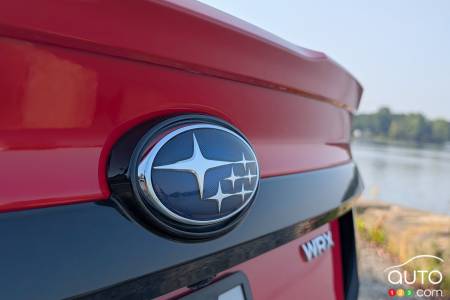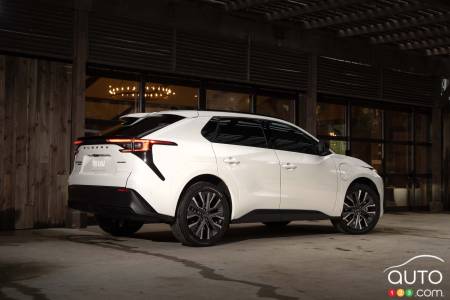Tariffs: Subaru reviewing electrification strategy | Car News | Auto123
Subaru is rethinking its transition to electric vehicles. Faced with the instability of international trade and uncertain environmental policies, the Japanese manufacturer is reviewing the pace of its electrification, including the timing and scale of its investments.
"We are re-evaluating our plans, including the timing of investments, in light of the current very changing environment and external business factors in the medium and long term," said CEO Atsushi Osaki on May 14th, during the presentation of the 2024 fiscal year financial results.
Subaru does not question its overall electrification goal. However, the company is slowing down the pace: a gasoline-electric hybrid Forester is planned for the American market, as is the all-new Trailseeker, a two-row electric crossover the size of an Outback, expected in 2026.

Subaru logo | Photo: D.Boshouwers
Subaru could take a hard hit of $3.4 billion CAD ($2.5 billion USD) in tariffs if the Trump administration were to impose new taxes on Japanese imports. As about half of the Subaru vehicles sold in the United States are imported from Japan, the manufacturer is seeking to minimize the impact by increasing its North American production.
Its Indiana plant produced 345,000 vehicles in 2024. It could go up to 500,000, according to Tomoaki Emori, a senior executive. However, current suppliers can only support a volume of about 370,000 units.
Subaru's annual operating profit fell by 13% to $3.6 billion CAD, while global sales decreased by 4.1% to 936,000 vehicles. In the United States, its main market, deliveries also fell by 4.1% to 732,000 units.
Subaru Canada, however, set a record with 70,000 vehicles delivered, an increase of 2,000 units. Sales fell by 17% in Europe but increased by 5.4% in Japan.

Subaru Solterra | Photo: Subaru
Subaru is cautious about the unclear trajectory of battery electric vehicle growth. Although a dedicated EV plant is in preparation in Japan, CEO Osaki admits that it may be necessary to consider mixed production with gasoline models.
The company still aims to electrify its entire lineup by the mid-2030s. But new Republican proposals in the US Congress – which aim to abolish tax incentives for EVs and ease fuel economy standards – complicate planning.
"It is becoming more difficult to decide how to integrate electrification into our production mix," says Emori. "Even if the shift to EVs slows down, these vehicles remain essential to combat global warming. We need to think about the right combination, including hybrids and plug-in hybrids."












